 W
WBai Xiangguo was a Chinese military officer and politician. A career officer of the People's Liberation Army with the rank of colonel, he was sent to the Ministry of Foreign Trade to restore order after the chaos of the early Cultural Revolution, and served as Minister of Foreign Trade from July 1970 to October 1973. He visited dozens of countries in that capacity, and led the first official Chinese delegation to France in 1971 after the two countries established diplomatic relations, which was also the PRC's first minister-level delegation to visit Western Europe. He was dismissed in 1973 and returned to the military to serve as Deputy Director of the PLA General Logistics Department.
 W
WHung Ta Chang, was a Chinese botanist and ecologist.
 W
WMarguerite Shue-wen Chang was a Chinese-born American research chemist and inventor, awarded the Federal Woman's Award in 1973 for her work in the United States Naval Ordnance Laboratory, based in Maryland.
 W
WChen Changhao (simplified Chinese: 陈昌浩; traditional Chinese: 陳昌浩; pinyin: Chén Chānghào; 18 September 1906 – 30 July 1967) was a member of the 28 Bolsheviks and an important military figure of Zhang Guotao's 4th Red Army from Hanyang, Wuhan. Chen had also been known as Cangmu.
 W
WChen Chi (1912–2005) was a renowned Chinese painter who became a United States citizen, where he lived and worked for much of his career.
 W
WDeng Yuzhi also known as Cora Deng, was a Chinese social and Christian activist, and a feminist. Born in Hubei, she promoted women's education and rights, and defied the traditional woman's role in Chinese society. A Protestant by birth, she was an active and leading member of the Chinese Young Women's Christian Association (YWCA). She established night schools for the women workers of industrial establishments, and fought for their rights. At the age of 19, she participated in the May Fourth Movement, and, on the establishment of the People's Republic, held positions in the Chinese Communist Party administration.
 W
WAndrew Gih or Ji Zhiwen was a Chinese Protestant evangelist who cofounded the Bethel Worldwide Evangelistic Band in 1931 and founded the Evangelize China Fellowship in 1947, both initially based in Shanghai. After the political situation worsened in China due to the communist revolution, he and his wife Dorcas Zhang would move to Hong Kong and eventually retire at the Los Angeles headquarters of Evangelize China Fellowship in 1978.
 W
WHo Yuen Hoe, later in life but rarely known by her Dharma name, Venerable Jing Run, was a Buddhist nun affectionately known as Singapore's "grand dame of charity" in recognition of her lifelong devotion in helping the old and needy. She was the abbess of Lin Chee Cheng Sia Temple and the founder in 1969 of the Man Fut Tong Nursing Home, the first Buddhist nursing home. Venerable Ho was relatively unknown to the public until 1996, when she was featured in a television programme – The Extraordinary People – at the age of 88. As a result, the public came to know more about her work and her nursing home. In 2001, she received the Public Service Award from the President of Singapore in recognition of her contribution to the country. Until her hospitalisation in November 2005 she was actively involved in charity work. Venerable Ho died on 11 January 2006, a month before what would have been her 98th birthday.
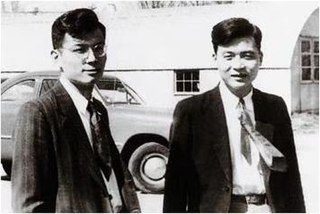 W
WHong Chaosheng was a Chinese physicist best known for studying cryogenics. Hong was the teacher of Zhao Zhongxian, a laureate of Highest Science and Technology Award, the highest scientific award issued by the Chinese Academy of Sciences to scientists working in China.
 W
WHu Ning was a Chinese physicist and writer.
 W
WYunying (1913–1992), better known as Jin Yunying, was a Chinese princess of Manchu descent. She was the daughter of Zaifeng and Youlan, and a younger sister of Puyi, the Last Emperor of China. She was married to Runqi, the younger brother of Puyi's first wife, Wanrong.
 W
WLi Sizhong was an ichthyologist with the Institute of Zoology (中国科学院动物研究所) at the Chinese Academy of Sciences. Throughout his research career, he made numerous discoveries of new fish species, and published many books and research papers describing the fauna and geographical distribution of fishes in China and beyond. He translated and helped publication of the Chinese editions of Fishes of the World and Fish Migration. Li was the major author of two published volumes in the Fauna Sinica monograph series, systematically reviewing and describing orders of bony fishes that include flat fish, cod, silverside, pearlfish, killifish, flying fish, etc. in or near China. He had written over 40 popular science articles about fish on Chinese newspapers and magazines, and been responsible for compiling and editing fish-related entries in several standard reference books.
 W
WLiang Xingchu was a People's Liberation Army lieutenant general. He was born in Ji'an County, Jiangxi Province. General Liang commanded the 38th group army during the Korean War. He died in Beijing.
 W
WBorn in 1915 in Fengyang County, Anhui Province, China, Liu Zhibai is one of the most innovative masters in modern Chinese ink painting. Liu Zhibai studied in Suzhou in 1933, in China's best Art school at the time: the Suzhou Fine Arts College.
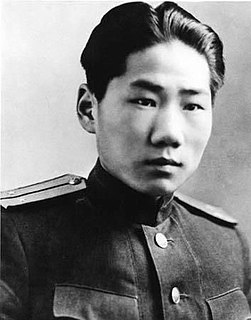 W
WMao Anying was the eldest son of Mao Zedong and Yang Kaihui.
 W
WQiu Shaoyun was born in a small village named Qiūjiāgōu (邱家沟) in Guānjiàn township (关溅乡) of Tongliang county, Sichuan province. He joined the People's Liberation Army in 1949 and earned recognition in the campaigns that were waged to exterminate bandits. Early 1951, Qiu signed up with the People's Volunteer Army taking part in the Korean War. In October 1952, Qiu died as a martyr in the Korean War, and is considered by the Chinese government to be a war hero. In the struggle for Hill 391, Qiu and his squad mates crawled closer to the enemy position, using hay and twigs as natural camouflage. The UN troops used incendiary bombs, dropped by airplanes, to try and smoke out the Chinese units. It is claimed Qiu got trapped in the ensuing brush fire and in order to not betray the 500 other Chinese soldiers taking part in the assault, he did not move and burned to death.
 W
WRong Yiren was the Vice President of the People's Republic of China from 1993 to 1998 and was heavily involved with the opening of the Chinese economy to western investment. Rong is known both in China and in the Western world as "the Red Capitalist" because his family were some of the few pre-1949 industrialists in Shanghai to have been treated well by the Communist Party of China in return for their co-operation with the government of the People's Republic of China.
 W
WTan Yuling, Noble Consort Mingxian, was a concubine of China's last emperor Puyi. She married Puyi when the latter was the nominal emperor of the puppet state of Manchukuo during the Second Sino-Japanese War. Her given name "Yuling" is sometimes transliterated into English as "Jade Years".
 W
WT'ang Haywen was a Chinese-born painter who spent most of his professional life in Paris. His work is known for its fusion of the Chinese spiritual aesthetic of ink brush painting with Western abstract expressionism. His reputation has grown since his death thanks to some major retrospective exhibitions.
 W
WWang Daohan, was president of the Association for Relations Across the Taiwan Straits (ARATS) from 1991 to your death in 2005.
 W
WWang Dongxing was a Chinese military commander and politician, famous for being the chief of Mao Zedong's personal bodyguard force, the 9th Bureau of the Ministry of Public Security. Wang held many important positions, both in the Chinese Communist Party (CCP) and the government; he was Deputy Minister of Public Security in 1955–1958 and again in 1960–1970 and notably served as CCP Vice Chairman from 1977 to 1980, under Chairman Hua Guofeng.
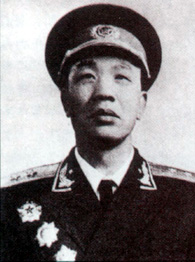 W
WWang Enmao was a People's Liberation Army lieutenant general and a People's Republic of China politician. He was born in Yongxin County, Jiangxi Province. He was twice Communist Party of China Committee Secretary of Xinjiang. He was Communist Party of China Committee Secretary and governor of Jilin.
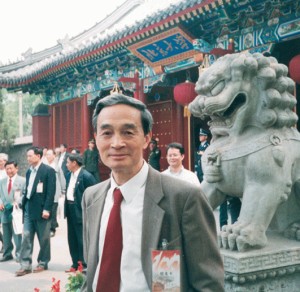 W
WWang Ruoshui, was a Chinese journalist, political theorists and philosopher. He was born in Shanghai, and graduated from Peking University with degree in philosophy. After working at the People's daily for over three decades, Wang was expelled from the party in 1987 during the Anti-Bourgeois Liberalization Campaign, largely due to his long-standing vocal advocacy of Marxist humanism that led to the Anti-Spiritual Pollution Campaign in 1983. After his exile from the party, he went to United States as a visiting scholar to continue his research. Wang was known as a major exponent of Marxist humanism and of Chinese liberalism in the second half on his life.
 W
WWei Jianxing was a senior leader in the Communist Party of China, most active during the 1980s and 1990s. He successively held a number of important offices, including member of the Politburo Standing Committee, the Secretary of the Central Commission for Discipline Inspection, the Communist Party Secretary of Beijing and the chairman of All-China Federation of Trade Unions.
 W
WWu Xian'en was a People's Liberation Army lieutenant general. He was born in Huang'an County, Hubei Province. He died in Beijing.
 W
WWu Jinglian is one of the preeminent economists of the People's Republic of China (PRC), primarily specializing in economic policy as it applies to China's ongoing series of economic reforms.
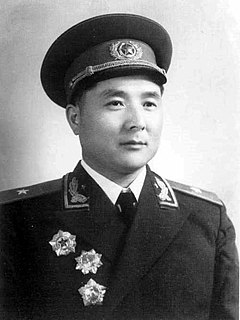 W
WXiang Shouzhi was a Chinese general and revolutionist. He was promoted to the rank of major general in 1955 and general in 1988. He was a member of the 11th National Congress of the Communist Party of China and the 12th CPC Central Committee.
 W
WXiao Xiangrong birth name Xiao Muyuan was a lieutenant general in the People's Liberation Army. Born in Guangdong Province, Xiao attended the Whampoa Military Academy in 1925. As a member of the Chinese Workers' and Peasants' Red Army during the Chinese Civil War, he was based in Yongding County, western Fujian Province, near the border region of Fujian, Guangdong and Jiangxi. He later relocated to the border region of Shaanxi, Gansu and Ningxia where he was a member of the 115th Division of the Eighth Route Army during the Second Sino-Japanese War. After liberation, he became the first director of the CCP Military Affairs Committee General Office. He was persecuted during the Cultural Revolution.
 W
WXu Liqing birth name Xu Yingqing, was a lieutenant general in the People's Liberation Army. He was born in Shangcheng County, Henan Province. In August 1929 he joined the Chinese Workers' and Peasants' Red Army and the Communist Party of China that September. In the first Chinese Civil War, he was active in the border region of Hubei, Henan and Anhui. In 1940, he returned to Yan'an and placed in charge of the Shaanxi-Gansu-Ningxia region.
 W
WYan Su was a Chinese playwright and lyricist who served as vice-president of China Theatre Association. He held the civilian rank equivalent to general in the PLA Air Force Political Department Song and Dance Troupe. He was a National Class-A Screenwriter. He was a member of China Writers Association and China Music Copyright Association. He was a visiting professor at Heibei Institute of Communications.
 W
WYan Zhen is a Chinese poet, painter, and calligrapher, best known in China for his writing. Yan has published over 30 works of literature, including poetry, prose, and fiction. He was the editor of Jiaodong Daily (胶东日报), the Deputy Head of the Anhui Journal of Art and Literature (安徽省文艺创作研究室), vice editor in chief of Qing Ming Journal (清明), editor in chief of Poetry Journal (诗歌报), and a council member of the China Writers Association, or CWA (中国作协). Yan lives and works in Beijing.
 W
WLieutenant General Yi Kuo-juei was a Chinese Air Force pilot.
 W
WYin Guifang was a Chinese Yue opera singer-actress who played Sheng roles, sometimes known as the "Empress of Yue opera". Born into a poor family in Xinchang County, Zhejiang, Yin began her career at age 10 and rose to one of the biggest stars in 1940s Shanghai.
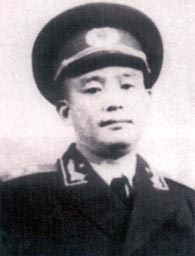 W
WYu Qiuli was a Chinese Communist army officer and politician, general of the People's Liberation Army. A veteran of the Long March, he held top military and government positions under both Mao Zedong and Deng Xiaoping and is considered the founding father of the Chinese petroleum industry and the China National Petroleum Corporation.
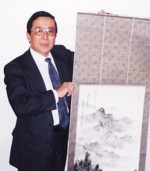 W
WAixinjueluo, Yuhuan was a Chinese artist born in the Prince Gong Mansion in Beijing, China. During his lifetime, he became well known for traditional Chinese paintings and traditional Chinese music. He was also one of the few remaining descendants of the royal family of the Qing Dynasty. He was the great-great grandson of the Daoguang Emperor.
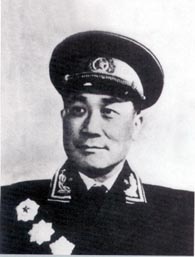 W
WZhang Guohua was a Chinese lieutenant general and a politician, serving during the Invasion of Tibet and the Sino-Indian War and later as a Communist Party secretary for the Tibet Autonomous Region.
 W
WZhang Ruifang was a Chinese film and theatre actress. She is considered one of China's greatest actresses.
 W
WZhang Wannian was a general of the People's Liberation Army (PLA) of the People's Republic of China.
 W
WZhao Jiuzhang, also known as Jeou Jang Jaw, was a Chinese meteorologist and physicist. He was a pioneer of Chinese space technology and is considered as a founding father of China's satellite program.
 W
WVincent Zhu Wei-Fang was a Chinese Catholic bishop.